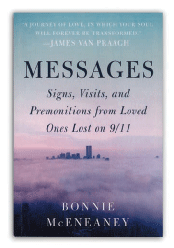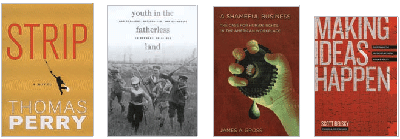Messages by Bonnie McEneaney, MPS '78 (William Morrow) 
Messages by Bonnie McEneaney, MPS '78 (William Morrow)
A few days after her husband, Eamon McEneaney '77, was killed in the attacks on the World Trade Center, Bonnie McEneaney felt his presence. "I'd had no spiritual experiences of this nature," she writes, "and was more than a little bit skeptical about the possibility of communication with another dimension. In the months and years after 9/11, I would learn more about the various ways in which people describe contact with those who have passed over." The former financial services executive recounts the stories of other September 11 families who have also experienced connections with their departed loved ones.

Strip by Thomas Perry '69 (Houghton Mifflin Harcourt). Set in Los Angeles, the plot features a series of sly reversals. Soon after Joe Carver arrives in the city, he must go to great lengths to stay alive and prove he didn't rob a strip club owner. He repeatedly bests the thugs sent to kill him and ends up costing the club owner far more than the nightly take. It's a novel where hired guns pretend to be police and the police lead secret lives outside the law, where a thrill-seeker turns into a psychotic killer and a trusted lieutenant usurps his crime boss's job.
Youth in the Fatherless Land by Andrew Donson '90 (Harvard). In Germany during World War I, teachers encouraged school-children to be enthusiastic about war. War pedagogy glorified militarism and nationalism, and sowed the seeds for extreme political movements. "After 1918," writes Donson, assistant professor of history at UMass, Amherst, "most German youths went on to lead uneventful lives, but hundreds of thousands grew up inured to violence and, in their bitterness over the disastrous defeat, turned to fascist groups." By the late Twenties, these young men made up almost half the members of the Nazi Party and other right-wing paramilitary groups.
A Shameful Business by James A. Gross (Cornell). Gross, a professor of labor law in the ILR school, questions the choices U.S. corporations make that put productivity and profits above workers' human rights. "Although the Universal Declaration of Human Rights offers no specific definitions of the individual and collective rights of human beings," writes Gross, "it posits a set of values, a new ethic of human rights, in sharp contradiction to the values that powerfully influence the United States' labor-employment system." He urges Americans to change from a "thing-oriented society to a person-oriented society."
Making Ideas Happen by Scott Belsky '02 (Portfolio). Having an idea is only the beginning of the creative process; execution is the hard part. Belsky, the founder and CEO of Behance, a company that helps innovators be more productive, provides practical tips on how to organize, collaborate, and lead. He encourages the notion of the "creative's compromise," the ability to adopt best practices that may seem uncomfortable at first. Leaders, he says, should develop a tolerance for ambiguity and appreciate the benefits of failure. "The ideas that move industries forward," writes Belsky, "are not the result of creative insight but rather of masterful stewardship."
Fiction
Changó, the Biggest Badass by Manuel Zapata Olivella, translated by Jonathan Tittler, PhD '74 (Texas Tech). Tittler, a professor of Hispanic studies at Rutgers University, Camden, translates the epic story of the African diaspora in the New World, from the middle passage to the Haitian slave revolt to contemporary civil rights struggles.
Crossing by Andrew Xia Fukuda '94 (Amazon Encore). Debut novelist Fukuda, a semi-finalist for the 2009 Amazon Breakthrough Novel award, tells the tale of Xing Xu, the only Chinese student at a predominantly white high school in upstate New York. When classmates start to disappear, Xing's outsider status allows him to discover clues to the mystery that others ignore.
Non-Fiction
Transatlantic Fascism by Federico Finchelstein, PhD '06 (Duke). An assistant professor of history at the New School traces the history of fascism in Argentina as it took the ideas of Italian fascism and transformed them into the peculiarly Argentine right-wing political ideology of nacionalismo.
Pioneering Women in American Mathematics by Judy Green '64 and Jeanne LaDuke (American Mathematical Society). Short biographies of the 228 American women who earned PhDs in mathematics before 1940, including Ida Metcalf, who earned her degree from Cornell in 1893.
Errol Morris: Interviews edited by Livia Bloom '01 (Mississippi). A film curator collects interviews with Morris, the Academy Award-winning documentary filmmaker of The Fog of War, The Thin Blue Line, and Standard Operating Procedure.
Awkward Family Photos by Mike Bender and Doug Chernack '96 (Three Rivers). Bender and Chernack showcase some of the cringe-producing photos of family vacations, bad wardrobe choices, and uncomfortable moments with relatives from their website, AwkwardFamilyPhotos.com.
Reaching the Animal Mind by Karen Pryor '54 (Scribner). A behavioral biologist explains her method for training animals without using punishment.
Alive and Well at the End of the Day by Paul D. Balmert '72 (Wiley). An expert on industrial safety advises front-line supervisors on the best ways to prevent accidents and injuries. Getting people to work safely all the time, he says, also has a bearing on a company's bottom line.


